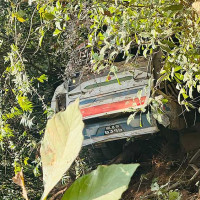- Thursday, 19 February 2026
Self-Fulfilment Calls For Broader Accountability
A personal sense of free self unfolds in a context and web of relationship with nature, society, institutions and the state laws. Self-consciousness about it arises out of the ability of a person to sense, reflect and comprehend one’s own identity, needs, desires and interests, understand the outer world and interpret them. The Upanishads unveil aham asmi, that is, “I am,” which is connected to the thought of life, associations and journey to self-realisation in the world. Life becomes hollow without it. Consistent pursuit of this belief spurs a sense of self-worth. In no way it means inflation of personal ego embittering social trust and heritage of tolerance to social pluralism.
A person’s prime instinct is self-protection. It comes with the formation of inner self and a meaning of life, without succumbing to conditioned reflex. Sage Astavakra says, “I am, hence the world exists, shines with the light of my universal consciousness and is wholly pleasant due to my blissful nature.” Unlike Rene Descartes and Samkhya philosophies of dualism of mind and body and Prakriti and Purusha, he deems the supreme nature of self totally non-dual and cosmic.
Conscious self
A conscious self is not alienated from human nature and social humanity. In no way does it mean only self-interested motivation spurred by sole utilitarian calculus without any drive to contribute to social goods. The ethical formation of self is the basis of community at multi-scale level and moral development of society, economy and politics. The great existentialist philosopher Jean-Paul Sartre says, “Man being condemned to be free carries the whole weight of the world on his shoulders, he is responsible for the world and for himself as a way of being.” The purpose of the existence of self is, however, not predetermined. It is created in the process of life getting maturity through awareness of self and enlarging the gaze of understanding of the phenomenal world.
Astavakra reveals that the “self is ultimate reality, eternal and universal,” and the goal of human life is to attain self. The experience of self resonates in “transcendence, bliss and peace.” Immanuel Kant agrees: individual self cannot be reduced to a means to other’s ends. Reducing human beings to other’s end whether class, caste, gender, religion, region or political party and conditioning their life for instrumental reason, not defined by them, only enfeebles their potential.
Similarly, a nation’s self-worth is rooted in the perception of people about themselves, their general will and the space they inhabit in a dense interaction with other peoples and nations to form a larger culture and civilisation. The trend of defining self is growing in Asia, Africa and Latin America as they find ascribed status repulsive and undignified. National leaders are rediscovering their intellectual, moral and cultural roots, expressing their priorities and issues and mobilising elegant rationale of people in national self-determination. Leaders of some nations are reviving their old national identity from the historical, cultural and linguistic processes beyond ideological whitewashing.
Others are refining their language, mode of teaching and enculturation through educational curriculum and shoring up vernacular idioms. Still others are focusing on civic culture to mobilise centripetal forces of society and project their identities. To renew their national life they are engaged in an arduous economic, political and cultural struggle to fulfil basic needs, legitimate desires and interests. Nepalis's claim to need-satisfaction is non-negotiable while rights realisation can be prioritised as per resource capacity of the nation and reflexive ties with the world.
Those enamoured by modernity, democracy and human rights are stressing on civic virtue of patriotism and transforming multiple identities of people into equal citizens able to self-determine self-respect and actualisation. These three cardinal values rear individual civic autonomy without being prejudiced to the use of technology and education for human progress though many educated Nepalis are resorting to a choice of post-traditional solidarity. Traditional solidarity is couched in group liberty and group identity while the post-traditional one provides individual choice and freedom. They set a link between personal life and ecological, social, economic and political processes that require collective efforts to manage.
Self-assertion is intrinsic to the constitutional entitlements. Nepali constitution grants negative rights to life, liberty and property, social rights of welfare and political rights of popular sovereignty. A variety of constitutional rights allow Nepalis their institutionalised engagement in politics, representation, interpretation about the condition of existence and democratic will formation. But they are linked with duties as well. One paradox Nepali faces now is the concept of self-governing human rights and traditional form of group-determined politics that restricts individuals to use their conscience and common sense. Party discipline subjects representatives to the impulse and whip of powerful elites exerting organisational power, law, resource control and opportunity.
One can see a shift from the personal definition of self by empirically-determined factors to self-chosen normative paradigm of democracy. Nepalis are also joining a myriad of institutions, organisations, unions and federations of their own choice and seeking to redefine their ties with the family, society, social contract, the constitution, polity, the state and international regimes. The mobility of Neplis from rural to urban areas and abroad, from fixed occupational position defined by caste and gender system to job-related shifts and feudal agrarian structure to financial capitalism have unfolded a new stencil resonating its classical notion of karma yoga, one’s conscious action can change the destiny without any influence of fate, prejudice, spinelessness and immaturity that recoil them to suffocating life and work in areas trivial to them.
The virtues of richness of associational personal life are well articulated by Buddha. It connects Nepalis to each other, creates leverage to participate in the impersonal institutions and enhances new sociability and solidarity for effective collective action. Now some ties are contractual such as labour and business contract, consultancy, etc. which are negotiated. Even family life in Nepal is veering to this direction and rupturing the traditionally practiced gendered and caste and class division of labour to individual autonomy evocative of personal is political. New inter-subjective knowledge is modifying the notion of disciplinary rationality of social sciences in self’s relations with the world. Multiple indigenous perspectives of Nepal are contesting the disciplinary boundaries from inherited community to self-chosen society ingrained in personal liberty and choice without resorting to mimicry.
The diffusion of democracy, human rights, justice and emancipatory forms of social movements in Nepal has enlarged the gaze of various groups of people into the public sphere, media of communication and civil society of multi levels beyond power circuit of politics, moneyed interest of market, positivism and reflexive development. On the contrary, commercialisation of the ecological, social and political sphere and capitalisation of national life continue to corrupt human reason to realise self and the location of self in the cosmic web of life. Power monopoly, politics of negation, denial of opportunity to the weak, exclusion and a lack of survival means continue to breed emotional reaction from the victims of Nepali society prompting them to organise cycles of social struggles, demonstration of grievances and revolts.
The only uneasy escape route is to migrate abroad or face loneliness. Critical discourses in the public spheres have informed Nepalis of their hierarchical and stratified place in society conditioning them to mini identity legitimised by the constitution, formation of auxiliary organisations of subsidiary identity or their own lineage-based identification. Only sustained democratic and compassionate knowledge of Nepalis, not attuned to instrumental reason, can ignite their conscious desire to balance popular sovereignty embedded in the constitution and state sovereignty legitimised by international laws and regimes. It can fertilise their ability to ignite confidence in shaping self’s values and imperatives.
Classical Nepali concept of Janata Janardan is now translated into a constitutional system of popular sovereignty with the authority to challenge arbitrary power exerting for the domination of people without legitimacy, accountability and popular will. Both guarantee that Nepalis are the ultimate shapers of political power, laws and public policies. Their collective wisdom builds an awareness of concern and strategies to solve shared problems. Nepali constitution has justified the vision of an egalitarian society in a condition of inequality of wealth, education and opportunity which restricts the precondition for equal freedom for all.
Access to common goods
Only the access to common goods can set the ground to make common future and stake in society, polity and state institutions, not self-interested action only. Nepali political parties have fostered conflicting identities and affinities of people in the same way as subsidiary identity politics which reduced them into mini identities, deflating their universal humanity. Nepali nation is defined by its own leaders, historians and literary figures, not outsiders though wars with imperial powers demarcated its national borders.
Its intellectual history began with spiritual and cultural roots, geographical and human features, linguistic connectivity, dress codes, art, music, symbols and careful longing for a spirit of higher goal of national independence and nirvana, emancipation. Defining the self means knowing about one's own inner self, retaining human traits and the worldview, free flow of conversation, creative thinking, setting preferences and acquiring habits, skills and areas of common sentiments, emotion and feelings. These help Nepalis to wriggle out of their wretched existence and gain a dignified life of freedom, bliss, dignity and peace.
(Former Reader at the Department of Political Science, TU, Dahal writes on political and social issues.)



-original-thumb.jpg)











